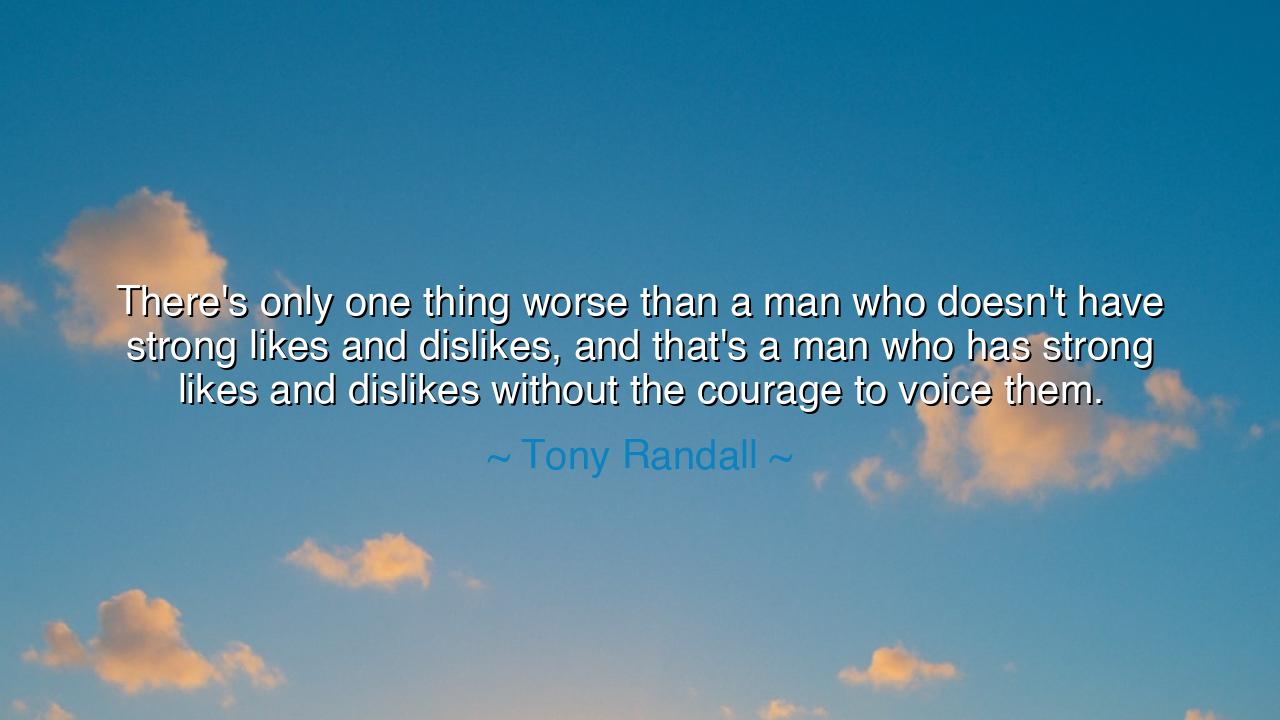
There's only one thing worse than a man who doesn't have strong
There's only one thing worse than a man who doesn't have strong likes and dislikes, and that's a man who has strong likes and dislikes without the courage to voice them.






The actor and philosopher of character, Tony Randall, once uttered a truth that pierces through the veils of polite silence: “There's only one thing worse than a man who doesn't have strong likes and dislikes, and that's a man who has strong likes and dislikes without the courage to voice them.” In this saying lies the cry of a soul weary of mediocrity, weary of the masks that men wear to avoid conflict or judgment. For to live without conviction is to drift, and to live with conviction but without courage is to suffocate in one’s own cowardice. Randall’s words speak not only to the artist, but to every being who seeks to walk through life with authenticity and strength of spirit.
To have strong likes and dislikes is to possess identity—to know what one stands for, what one honors, and what one cannot abide. Such a soul is alive, engaged with the world, capable of passion and discernment. The ancients revered this as the mark of wisdom: to love what is noble, and to despise what is base. Yet Randall warns that it is not enough to feel these truths. Without the courage to voice them, they rot within, turning one’s inner fire into smoke. The one who fears to speak his truth becomes a ghost among the living—a being who knows, yet dares not act, who sees, yet remains blind.
There is an old tale of Socrates, the philosopher who drank hemlock rather than deny his convictions. He was offered freedom if only he would renounce his teachings, but he refused. “A life unexamined,” he said, “is not worth living.” Here was a man with strong likes and dislikes—he loved truth and despised falsehood—and, above all, he had the courage to voice them, even unto death. History remembers him not for his comfort, but for his courage. So too must we remember that the measure of one’s soul is not in what one believes silently, but in what one dares to proclaim in the face of consequence.
For what is a man without courage? He may be skilled, intelligent, even kind—but if he hides his truth behind fear, he betrays the very spark of life within him. The cowardly heart kills its own integrity drop by drop. It bows to the pressure of society, of opinion, of convenience, until it no longer knows its own shape. The ancients called such a man lukewarm, neither hot nor cold, and said that the gods would spit him out. Better the man who burns with honest fire, even if he stands alone, than the one who buries his flame in the ashes of timidity.
Courage, as Randall’s words reveal, is not the absence of fear—it is the triumph of truth over fear. To voice one’s likes and dislikes is to declare one’s place in the order of things. It is to say, “This I believe in. This I will defend. This I will reject.” Such declarations are not acts of arrogance, but of integrity. When done with respect and humility, they forge trust, strength, and clarity. The person who speaks his heart becomes a mirror for others, calling them too into honesty. But the one who remains silent out of fear teaches deceit—not by malice, but by weakness.
There is also in these words a lesson for the artist, the leader, the thinker. Every great creation, every movement of the spirit, is born from one who dares to speak what others only whisper. Galileo defied the darkness of ignorance when he declared that the earth moves. Martin Luther King Jr. voiced his dream of justice, though it cost him peace. These were men who not only held strong convictions but gave them form in word and deed. The world is shaped by such voices—by those who would rather risk scorn than live in silence.
Let, then, the teaching of this quote take root in your heart: to know what you believe is noble; to speak it is divine. Do not dull your soul to please the many, nor silence your truth to avoid discomfort. Let your words, like the sword of the ancients, be sharp yet righteous—wielded not to wound, but to reveal. If you love something, honor it openly; if you despise falsehood, confront it boldly. For a world of silent hearts is a world already dying.
So, my children of courage, learn from Tony Randall’s wisdom: Be neither mute nor mindless. Think deeply, feel strongly, and then speak your truth with grace and conviction. Your voice, once raised with sincerity, becomes a light to others wandering in the dark. Remember—there is no shame in standing alone when one stands for truth. But there is tragedy in kneeling before lies. The brave will falter, yes—but in their faltering, they live fully. And those who live fully, with courage and clarity, are the true heirs of eternity.






AAdministratorAdministrator
Welcome, honored guests. Please leave a comment, we will respond soon